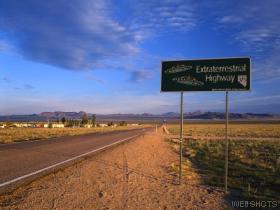Signs
 John 5 - Part 2
John 5 - Part 2When I was eighteen, I went on a trip to Orlando. For months before hand I was amped for this trip, not because I like the mouse, but because there is such a mystique surrounding Disney World. It is "the magic kingdom." It is "the happiest place on earth." It is the American Hajj.
What I remember most clearly was not the theme park itself, but the trip there. I remember getting in a rental car, driving down the highway, and all of a sudden seeing the highway split. A giant sign announced that the two lanes to the left were headed to "Miami" (city of a couple million people), but the five lanes to the right were headed to "DISNEYWORLD".
The sign blew my mind. I remember shivering a bit and thinking, "It's gonna be huge!!"
Signs can be quite exciting. There is a city in America that must spend billions of dollars on just their signs. This city has gone so far now that not only do they have five story TV screens and dancing lakes, but the buildings themselves have become signs: shaped like giant Pyramids and even entire city skylines. Las Vegas should have been called Las Uber-Sign.
A few years ago my wife and I went to Las Ubersign on a climbing trip. After a few days in the desert, we decided to walk through the city to see the sights (and look for a free shower). We spent at least 12 hours just looking at things that were supposed to draw us into the casinos: huge fountains, pirate battles, volcanoes exploding. There is a real problem with people being fascinated with your signs. They may be so interesting that they care little for what the signs are point to.
All through John's gospel, Jesus has a Las Vegas problem. People are more interested in his miracles than they are in what his "signs" point to.
Jesus understands this, and so he begins to undermine the people's curiosity. At the end of chapter four, Jesus returns to his hometown. Now, everyone has heard that the local boy is out doing some pretty impressive things. So people are out in the streets waiting for the fireworks to start. They are there to see the signs. They are there to ogle, but Jesus decides to withhold his power for the day. He has no interest in signs for signs sake.
However, there was also a man there who worked for King Herod and had come 17 or so miles to beg for Jesus help. You see, his son is dying of a severe fever and he is desperate.
This man, instead of exercising his power over Jesus and dragging him to his child's bedside in chains (which royal officials could probably do), pleads to Jesus to come and heal his son. In response to his request for help, Jesus simply says, "You may go. Your son will live." No fireworks. No neon lights. No five story TV screen. But the man "believing Jesus bare words" left on the long journey home with only a promise.
The writer and Jesus both desire the sign to recall an important story from Israel's past in which Yahweh comes to a man named Abram and says, "Go to the land I will show you." This is the beginning of God's relationship with the Hebrews. And Abram--who would later be renamed Abraham--"left as the Lord had told him." He believed Yahweh's bare words and went.
Jesus' signs are not arbitrary. They point to something. This is a clue to keep in your mind.

0 Comments:
Post a Comment
<< Home